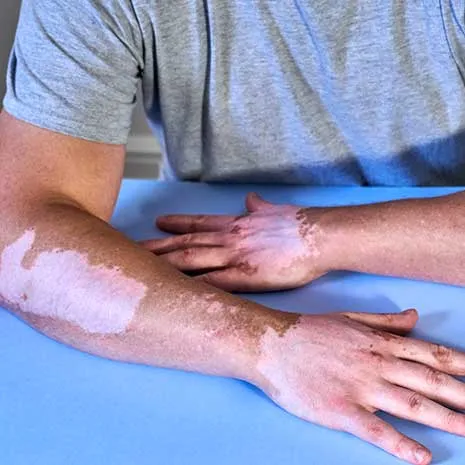What Is the Relationship Between Vitiligo and Stress?

What Is the Relationship Between Vitiligo and Stress?
- 11 August 2025
- 201

More Than Skin Deep: Is Vitiligo Triggered by Stress?
Vitiligo is an autoimmune skin condition where the body attacks melanocytes—cells responsible for pigment. While the exact cause remains unclear, emerging research highlights a strong link between psychological stress and vitiligo development or exacerbation.
The interaction between mental health and skin diseases is the focus of a growing field called psychodermatology, which explores how emotions and stress influence skin health.
How Does Stress Affect the Immune System?
Stress activates the hypothalamic-pituitary-adrenal (HPA) axis, leading to the release of cortisol and adrenaline. Although short-term stress can suppress immunity, chronic stress may deregulate immune responses, contributing to autoimmune activity.
Key Immune Changes Triggered by Chronic Stress:
- Increased inflammatory cytokines (e.g., IL-6, TNF-alpha)
- Altered T-cell responses
- Oxidative stress and free radical damage
- Enhanced melanocyte vulnerability
- Triggered apoptosis (programmed cell death) of pigment cells
These mechanisms can result in autoimmune attacks on melanocytes, promoting the onset or worsening of vitiligo.
How Stress Influences Vitiligo
1. Stress as a Trigger for Onset
Many patients report that their first vitiligo patches appeared during a period of high emotional stress, such as loss of a loved one, job loss, trauma, or chronic anxiety.
Studies show that 40–60% of vitiligo cases have a history of significant stress shortly before onset.
2. Stress-Induced Flare-Ups
Ongoing psychological stress can intensify disease activity, leading to new or expanding patches. Anxiety, sleep deprivation, and depression are often associated with worsening vitiligo.
3. Impact on Treatment Response
Patients under chronic stress may respond less effectively to treatment such as phototherapy, topical immunomodulators, or corticosteroids. A constantly activated immune system limits therapeutic success.
When Vitiligo Causes Stress in Return
Vitiligo itself can become a source of psychological distress, especially when visible areas like the face or hands are affected. This may lead to:
- Low self-esteem
- Social withdrawal
- Anxiety and depression
- Impaired quality of life
This creates a vicious cycle: stress → vitiligo → more stress → disease progression.
Psychoneuroimmunology: Bridging Mind and Immunity
Psychoneuroimmunology (PNI) is the study of how mental states affect the immune system. In vitiligo, chronic stress can alter immune signaling and affect melanocyte survival.
PNI Insights into Vitiligo:
- Stress hormones impair skin cell regulation
- Autoimmune responses against melanocytes increase
- Neurotransmitters (serotonin, dopamine) impact melanogenesis
- Stress-related neuropeptides influence inflammation and pigmentation
This makes it clear: mental health must be part of vitiligo management.
Can Stress Management Improve Vitiligo?
Yes. While stress reduction won’t cure vitiligo, it can stabilize immune activity and enhance treatment response.
Effective Strategies Include:
- Cognitive behavioral therapy (CBT)
- Mindfulness and meditation
- Regular physical exercise
- Adequate sleep hygiene
- Creative or social outlets
- Building healthy coping skills
Several studies confirm that patients receiving psychological support alongside medical treatment show better long-term outcomes.
Frequently Asked Questions
Yes. Severe emotional stress may initiate or accelerate vitiligo in predisposed individuals.
Absolutely. Visible skin changes can affect confidence, relationships, and mental well-being.
Not directly, but reducing stress can improve immune balance and support medical treatment outcomes.
Not in every case, but it is a significant factor for many patients and should not be overlooked.
Yes. Especially in widespread or emotionally distressing cases, psychological care is essential.
